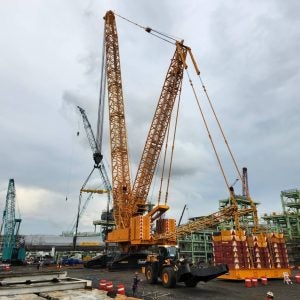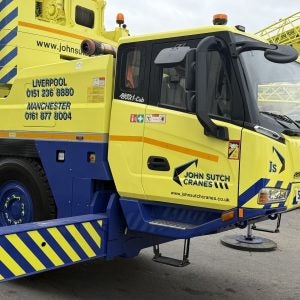The system, called the Construction Plant Competence Scheme, issues cards to crane drivers, riggers and crane management personnel, as well as other construction trades. A valid cards is required to work on the sites of contractors that are part of MCG (Major Contractors Group) and NCF (National Contractors Federation) sites.
The system is linked to a UK-based craft trade education system, called National Vocational Qualifications (NVQ), and is paid by a levy on the workers’ employers.
After initial training, workers get a red card, valid only for three years. To continue working, they must take an NVQ test to receive a blue card, which is valid for five years, before taking another exam. A few years ago, this scheme, intended to track experience as well as training, replaced another card that only certified that the holder had training.
The organisation that has left the CPCS runs its own system, the National Plant Operators Registration Scheme. This does not require contractors to be assessed to NVQ standard.
Paul Daniels, NPORS procedure manager, explained why it decided to leave CPCS: “The old CTA scheme provided cards on the basis of a signature from a manager or supervisor – there was no testing. CPCS accepted transfer with no testing beyond basic health and safety. Of 110-115,000 blue cards, less than 1,000 have an NVQ attached. We were putting our names to a card that’s supposed to be competence based, but isn’t.” (Chairman of the CPCS management board Trevor Gamble disagreed: “Every plant operator who transferred from CTA to a CPCS blue card was assessed on every category on their card.”)
More than 70,000 equipment operators will need NVQ assessment to obtain their blue card, according to the CPCS. But there are only about 60 NVQ-accredited training providers, according to Mick Norton, former Federation of Piling Specialist representative on the CPCS board and training manager at Roger Bullivant. He said the main stakeholders in the CPCS “seem impotent to provide a solution – what are they doing?”
Ian Fisher, director of Ainscough Training Services, which is an accredited provider, blames the training providers. He says that for many, NVQ assessment does not pay – and so trainers are not willing to convert red cards to blue ones. “NPORS have a commercial interest here – training brings in three times the money that NVQ assessment does. As a provider, you have a moral obligation to convert training into an NVQ.”
CPCS chairman Trevor Gamble admits that a monitoring programme to identify problems moving from red to blue cards has been delayed. Funds have now been arranged, he said.
Gamble added that he thought that employers’ pressure to carry a card will mean that providers who only offer initial training, but not NVQ assessment, will not be able to run viable businesses.






